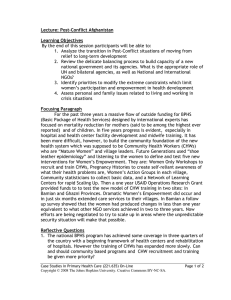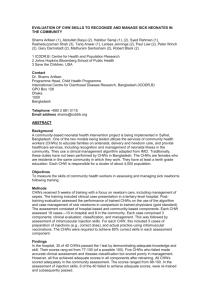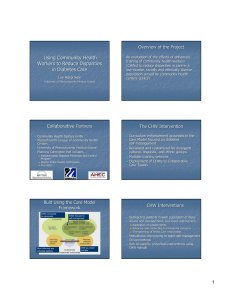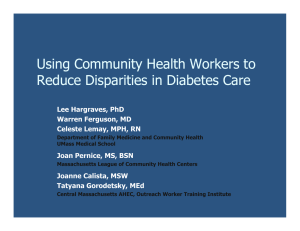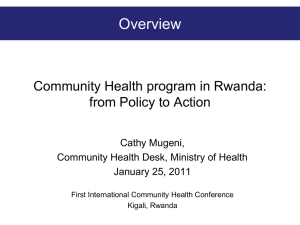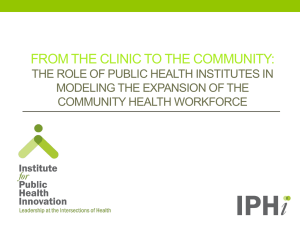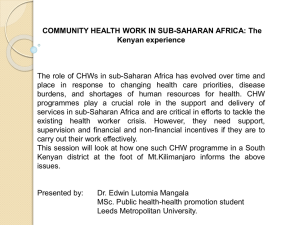Using Community Health Workers to Reduce Disparities in Diabetes Care Lee Hargraves
advertisement
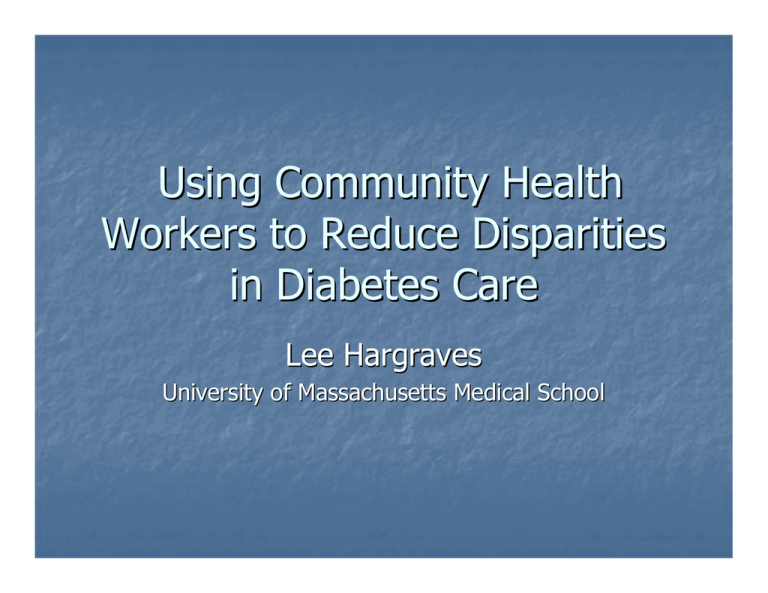
Using Community Health Workers to Reduce Disparities in Diabetes Care Lee Hargraves University of Massachusetts Medical School Overview of the Project An evaluation of the effects of enhanced training of community health workers (CHWs) to reduce disparities in care in a low-income, racially and ethnically diverse population served by community health centers (CHCs) Collaborative Partners Community Health Centers in MA Massachusetts League of Community Health Centers University of Massachusetts Medical School Planning Committee that includes, Massachusetts Diabetes Prevention and Control Program Boston Public Health Commission MassPRO The CHW Intervention Curriculum enhancement grounded in the Care Model focused on diabetes self-management Reviewed and customized for divergent cultural, linguistic, and ethnic groups Multiple training sessions Deployment of CHWs to Collaborative Care Teams Built Using the Care Model Framework CHWs connected to community More informed and activated patients CHWs focused on self-management CHW as a team member CHW Interventions Outreach to patients in each population of focus Assess self-management, successes and barriers Exploration of cultural norms Advocacy and connecting to community resources Strengthening of health care relationships Motivational interviewing to teach self-management Group meetings Rely on specific, prescribed interventions using CHW manual Community health workers (CHWs) in health care delivery have gained prominence, proliferated in communities of racial and ethnic minorities, increased access to care for underserved clients, and assisted individual’s navigation of the traditional health care system. Recent review studies have demonstrated the impact of CHWs on service delivery providing culturally relevant health education Assisting with case management system navigation case finding Effects of CHWs on health behaviors for diabetes care are mixed Little is known regarding CHWs impact on self-management goals and practices. Additional research is needed to identify: specific, replicable characteristics of successful interventions optimal training of CHWs optimal documentation of their activities. Organizations that acknowledge the contributions of CHWs include The Institute of Medicine Centers for Disease Control and Prevention American Public Health Association American Association of Diabetes Educators Each recommends including CHWs as important members of the health care team. Recruiting and retaining CHWs can present challenges May lack professional training and experience Insufficient training Unrealistic expectations from co-workers Burnout Addressing the challenges Recruiting from within the participating community health centers Specific training curriculum (45 hour) incorporating Chronic Disease Model Training of co-workers regarding CHW role Training of supervisors Ongoing support and training Project’s Unique Aspects Baseline data from Diabetes Collaborative Randomized with match paired comparison sites Intensive CHW training with focus on self management of Diabetes Training of health care team to assist integration of CHW CHW Encounter Forms for data collection Training Community Health Workers Outreach Worker Training Institute’s 45-hour CHW Certification Course 8-Part Training (six hours per week) 8 Outreach core competency sessions 7 Care model and diabetes sessions Eight Core Competencies Service Coordination Skills Interpersonal Skills Communication & Interviewing Skills Organizational Skills Presentation & Facilitation Skills Individual & Community Assessment Skills Advocacy and Leadership Skills Cultural Awareness & Sensitivity Skills Seven Diabetes Components Diabetes in Diverse Communities Nutrition and Physical Activity for Diabetes Self Management Access, Follow-up, and Supportive Care Cross Cultural Beliefs and Diabetes Primary, Nursing, and Specialty Care Individual and Group Teaching Skills Mental Health and Diabetes Management Self Management Goal Setting Theme woven throughout curriculum Patient Directed Stages of Change Motivational Interviewing Realistic Goal Setting Role Playing Exercises Documentation (The Encounter Form) Training CHW Supervisors Supervisor Certificate Course 6-Hour training for individuals tasked with overseeing CHWs in the field 2 3-hour weekly sessions Supervision strategies, conflict resolution, and professional boundaries Roles and needs of CHWs and their supervisors Evaluation Components Quantitative Patient Surveys Clinical Quality Indicators ACIC Key Personnel Survey Qualitative Focus groups with all CHC teams, post intervention CHW patient encounter forms Monthly team narratives Site visit in-depth interviews at all CHCs Next Steps CHWs become a valued member of the Health Care Team Practice skills learned Acquire new skills Periodic conference calls Evaluation includes… analysis of sites with trained CHWs pre/post intervention to control community health centers without CHW Patient Surveys Clinical Outcomes Data Narrative Reports Qualitative data via focus groups and intensive interviews Clinical Outcome Data Health Centers collect and post clinical outcome data monthly to Virtual Office Average HgA1c for Population of Focus Percentage of patients with 2 HgA1c tests in 12 month period Self Management Goal setting Cardiac Risk Reduction Statins, ACE inhibitors or ARB, ASA, BP, LDL “Thanks for this great opportunity to learn more about diabetes in general and also for the opportunity to share with colleagues working in the same field. Healthy People make a Strong Community.” A graduate of OWTI’s Diabetes CHW Training
